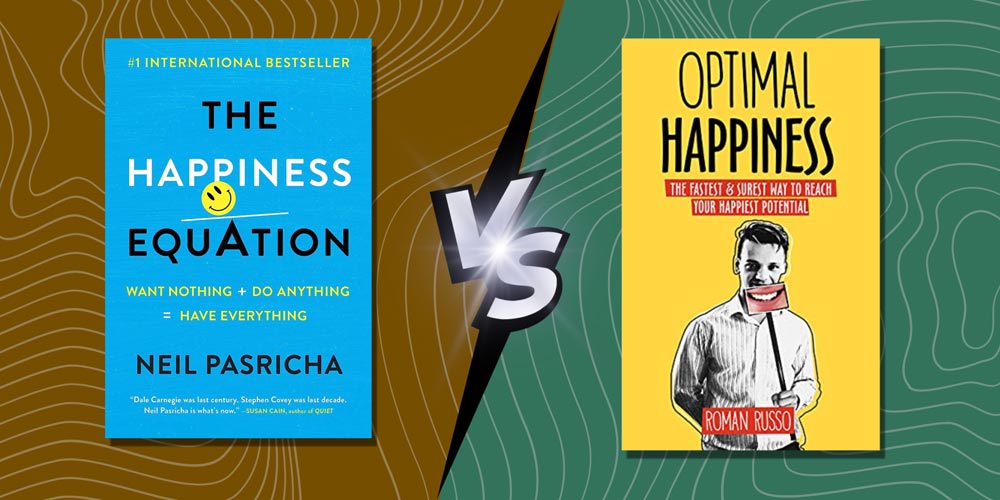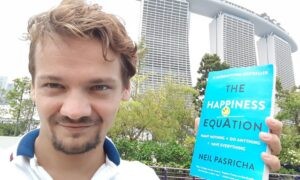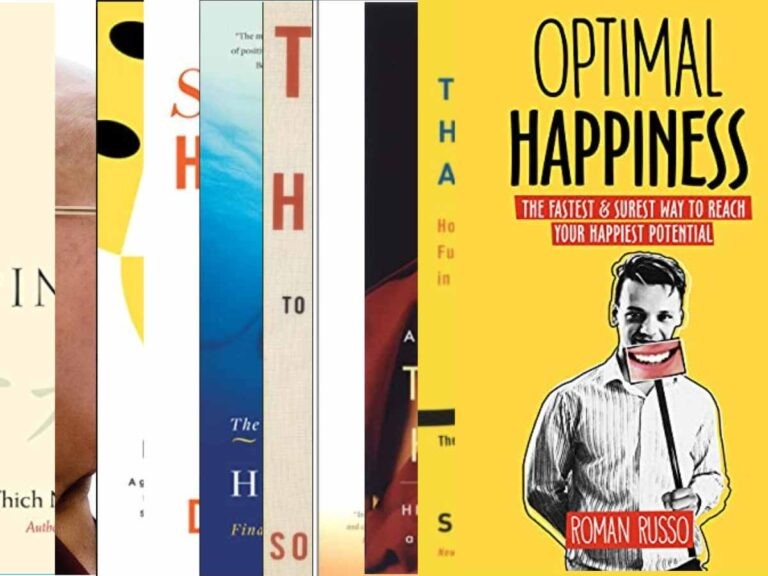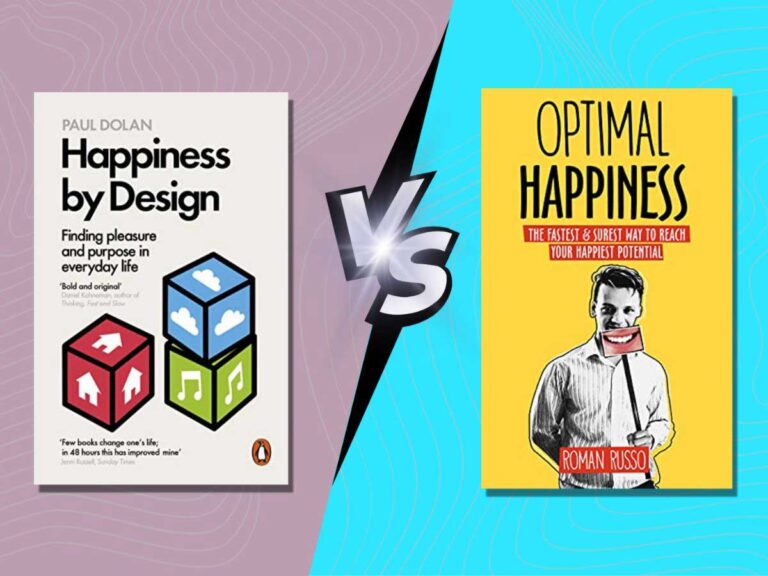
I decided to read and review every possible book on Happiness and other happiness advice we see in videos, audio-books, and other sources. There are many books to read, but I feel excited about what other authors think Happiness is, with my first review covering:
The Happiness Equation: Want Nothing + Do anything = Have Everything, by Neil Pasricha
I think this is fair because my reviews only praise people just because they wrote a book, and even challenge some of their ideas. This is what I decided to do in the first part of the review. In the second part, I focus on things I agree with the author. I finish my review by praising the author for teaching me something about Happiness, even inviting him to answer a question I have about teaching Happiness. Enjoy:
Part 1: Is This Really Happiness?
Leadership Author Talking About Happiness?
First of all, the author’s background is essential because many so-called “experts” give us advice that sounds correct, but which, in reality, is misleading, incomplete, or plain wrong. Of course, they get a few things right, but we should always be careful with anyone who is not specialized in Happiness.
Indeed, in the case of Neil Pasricha, he is a leadership coach. As such, he teaches at companies to improve their performance. The idea here is that better understanding leads to more Happiness.
Performance > Happiness
And while this is only one part of the happiness equation, I believe that at least 50% of this book addresses this specific relationship.
Happiness In Story Telling
Of course, there are many ways to write a book. One such way is to write a story with a lesson, which is pretty much how this book is written. Indeed, this is a great way to write a book, as we are said to remember stories better, but there is a catch.
Stories only show concepts superficially, meaning we won’t know how to apply these concepts in our lives specifically.
For example, Niel gives us “7 things that will make us happy today,” which are:
- Go for a walk
- Think back to old positive memories
- Make a random act of kindness
- Unplug
- Get into Flow
- Meditate
- Be grateful
All these techniques are presented at face value. We are just told to do them, and we will be happy. Still, while they can make us happy, we can also waste our time or get negative experience if we do them incorrectly.
Part 2: You nailed it! This is Happiness
“Want Nothing.”
Neil correctly saw that current society often fails to make us happy. This is because we have different “wants” and “needs.” “Wants” are infinite, while “needs” are finite. Thus, endless materialism won’t make us happy. True Happiness comes from within, it is condition independent, and we don’t need to want to have anything to be happy and alive. The only actual situation is to be alive.
Origins of Negative Self Talk
The happiness equation talks about the origin of negative emotions, saying that they come from ancient times when every day was a survival fight. Therefore, we needed negative emotions to stay alive as “only the paranoid will survive.” But, these times are over. In a new world, we are rarely faced with life or death situations, so there are so many of us today living in the world. Yet, the out negative outlook at the world remains. We still have an active amygdala that is looking for problems in the world. This is one of the reasons we are unhappy today. Said, this ancient system prevents us from being happy.
Regardless, I often argue that we can be happy most of the time. This usually starts vivid discussions, which I welcome, as I believe that negative emotions are important but only to a certain extent. We can learn how to control these emotions, so they don’t control us, making anyone happy most of the time.
Hide, Apologize, and Finally Accept
This is another big concept, as even in my life, I often feel like Hiding and Apologizing for my emotions, avoiding Accepting them instead. For example, I once heard that I was saying too much “sorry” and “thank you.” I had low self-esteem and would practically “kiss ass”. Even as I got older, I was still Hiding and Apologizing, often lying about my name, age, and nationality. I even faked my wedding, which was somewhat fun, but I did it because I was immature and insecure. I just preferred to hide behind humor than to show people how I felt.
To this point, Neil says that “when we apologize, we avoid ownership, create distance, and suggesting that we are doing something wrong,” meaning that it is not the healthiest way of conducting ourselves. Judgment disappears when we have complete ownership, self-acceptance, vulnerability, and integrity with ourselves and our problems.
Part 3: I Learned Something Today About Happiness

Life Is 10% What Happens And 90% Of How We React To It.
When I teach Happiness, I often have to say “most of the time,” “there are, of course, exceptions,” and “despite these exceptions, for most people, this rule holds.” This is why I liked this insight so much as it gave me an extra dimension into happiness mathematics.
It feels that it is logical that it is our reaction to what happens in the world that makes us happy or not. Still, it’s nice to know the specifics, that 90% of our Happiness will come from our mindset, while only 10% from our circumstances, such as how much money we have and how good are our social relationships.
“Do It For You“
Another big winner for me in this book was the idea that we need to decide to be happy for ourselves, not for someone else. Indeed, so many people try to please their parents, partners, or the general public. They think that other people’s approval will make them happy, which is rarely the case.
Even in my personal life, sometimes I don’t follow this rule, as I don’t do what makes me happy. The most significant example of it is when I feel unhappy at work. I used to work for a high salary, doing things that I didn’t like, and it made me very unhappy. I also worked for free, doing what I wanted, and I didn’t care about the lack of money, as it made me happy.
As such, Neil says, “Commissioned work will tend to be less satisfying than work that we do from our self-interest,” which confirms already stated above.
Additionally, “We are not competing with others, just with ourselves.” This is important, as whenever we are competing with others, we will feel negative and want to give up as soon as we know we can’t win. Therefore, competing with others is hard as virtually always there is someone who is doing way better than us. However, if we do activities for ourselves, we will do them for longer and better, which will make us happier.
Thus, we need to do activities for ourselves first.
Retirement Won’t Make You Have, Unless …
There is a common myth that when we retire, we are finally free and happy. We will get free money from the state, travel the world, and essentially do whatever we want. However, retirement is an outdated concept that is on many levels wrong. Initially, the retirement age was set at 65 years old, as our life expectancy was 67. Today, we are expected to live way longer than this number, we have to pay money for our retirement, and often we get depressed as soon as we retire. This is because we can’t practice whatever they used to be doing before we retired, so we don’t have a mission in life, no reason to live.
Neil confirms this by saying that our brain has to be occupied with problem-solving always, even after we retire. Ideally, we still need to do things that we love. Thus, when we retire, we can continue doing them, with or without government approval. We need to be actively focusing on what matters to us, and we will be happy.
My Question To Neil Pasricha
Lastly, I am confused about how to coach Happiness at work. Specifically, I believe that most people who work in corporate jobs are not as happy as possible. Logically, if coaches want what’s best for the people, they would inspire them to follow their passions and dreams. This would lead to some people leaving their jobs, which I suppose is not the primary goal of managers who hire coaches to train their staff. Thus, the question: How can we teach Happiness at work? Specifically, do we only focus on increasing productivity? Or Do we withhold some information about what it takes to be happy?
Liked this review?
Than i invite you to stay in touch with future reviews via my newsletter, FB page, or simply by reading other reviews that I had time to do already.














